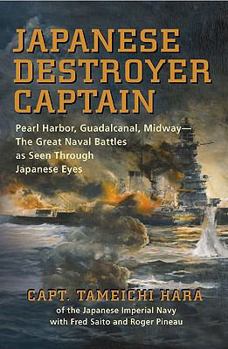Japanese Destroyer Captain: Pearl Harbor, Guadalcanal, Midway - The Great Naval Battles as Seen Through Japanese Eyes
Select Format
Select Condition 
Book Overview
A highly regarded war memoir long treasured by historians for its insights into the Japanese side of the war in the Pacific.
Format:Paperback
Language:English
ISBN:1591143845
ISBN13:9781591143840
Release Date:August 2011
Publisher:US Naval Institute Press
Length:336 Pages
Weight:1.10 lbs.
Dimensions:0.9" x 6.0" x 9.0"
Customer Reviews
5 ratings
1st class
Published by Thriftbooks.com User , 17 years ago
i first read this book 40 years ago and have recently completed it for a third time. excellent primary source account from a japanese perspective during ww2. an exceptional translation and the author's story make j.d.c. more a story of fate and luck rather than one of duty and war. a fine addition to anyone's book collection, not just those with an interest in ww2.
Good wartime biography - eye opening
Published by Thriftbooks.com User , 17 years ago
I picked up my copy at a Gun Show a few years ago. I've long been into Japanese military history and thought at least there would be a few decent war stories here. In fact, Tameichi Hara was one of Imperial Japan's best sailors and survived to the end of the war with many DE's sunk out from under him. Though I suspect the prose was dumbed-down a bit for Westerners in the translation from the Japanese edition, which sold like hotcakes in Japan in the '70s I later discovered, enough passion and emotion shows through to make it seem as if Hara-san was sitting with the reader, cracking open an Asahi, and regailing him with accounts of the past. His knowledge of and personal connections with the movers and shakers of the Imperial Navy like Nagumo, Kantaro Suzuki and Mitsumasa Yonai are interesting. For all his acheivements though Hara seems to have been, at the end of the day, basically a down to earth humble man and given his cosmopolitanism and magnanimous attitudes both during and after the war to Americans - his former enemies - someone exemplyfying the best his country had to offer. A fun read. This one's been out of print for awhile but do score a copy if you like a skipper's eye acount what it was like in the tin-can fleet of the Imperial Navy.
Required reading about the Pacific War, the nature of Japan, being human
Published by Thriftbooks.com User , 18 years ago
The other reviewers have eloquently stated the case. This is a book you will read and re-read throughout your life. It is first and foremost an incredible eyewitness account of the Pacific War by a ship captain who was intimately involved in many of the key small battles of the war (the major battles were settled by air power, not his area). It is one of the best written war accounts to come out of any nation. Secondly, it provides an unique insight into the Japanese at the time that has relevance over the entire 19th and 20th centuries, explaining such things as the origin of the Japanese navy in imitation of the American and British navies...which can easily be taken as a model for the industrial imitation leading up to Japanese economic superpower status by the 1980s. Finally, Hara is a great autobiographist who shares his heart, displays his heroism and intellect, but does not fail to describe his weaknesses. Whenever there is a conflict, war or political or business or social, it is good to remember the other side is human too.
One of the best books I own
Published by Thriftbooks.com User , 23 years ago
Little can be added to the reviews below, expect to add that this book really shows how Hara was a leader of men. In spite of IJN policy and militaristic propaganda he trains his crew to a superlative level. He is also brutally honest about himself and his mistakes and foibles. Add to this some invaluable historical eyewitness data and you have a great book. Hara, by rewriting IJN torpedo doctrine in the 30's, can honestly be said to have contributed more to the IJN's battle success than any other person. This book is rich in history and flavor and well worth tracking down. My paperback copy is in three parts with the spine gone, but I still consider it one of the stars of my collection.
The Last Samurai
Published by Thriftbooks.com User , 24 years ago
Hara is the last samurai. He objected to compulsory suicide as official doctrine, because he saw this as a violation of bushido values. He turned pacifist BEFORE the Bomb. His personal doctrines demonstrate why the Japanese lost the war--they were inflexible. Hara wasn't. His doctrines were "Never ever do the same thing twice" and "If he hits you high, then hit him low; if he hits you low, then hit him high," the latter a maxim of MacArthur's, too. Hara criticizes his superiors for using cavalry tactics to fight naval battles; never understanding the implications of air power; dividing their forces in the face of enemy forces of unknown strength; basing tactics on what they thought their enemy would do; and acceping a war of attrition with a foe more capable of maintaining it. His technical discussions are superb. What gives the book significance is his explication of strategy/tactics and their implications. Hara is a brave man who knew WHY he did what he did. This puts him in a minority, in any navy.




